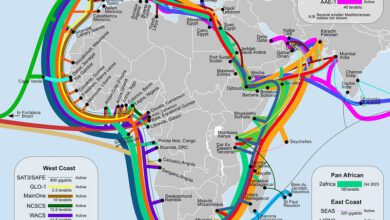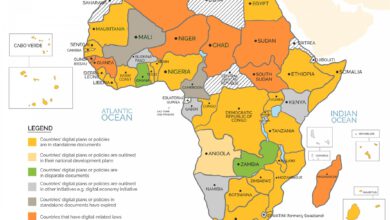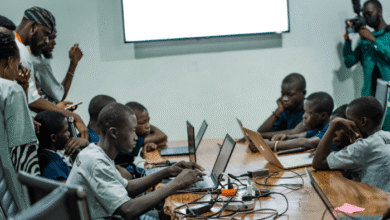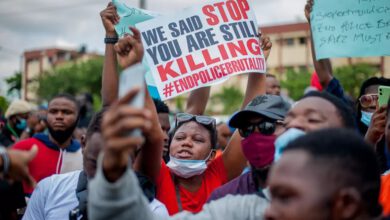Digital Literacy Campaigns in Rural Africa
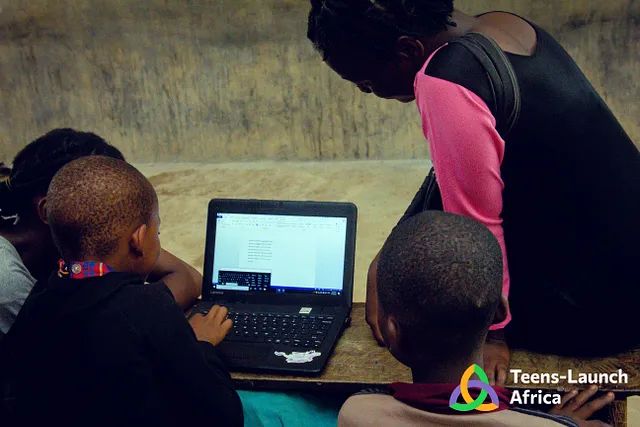
Tanwa had never touched a laptop until she won one for her school in Ipebe after a quiz competition. It was the first computer in the entire village, and the students gathered wide-eyed as a new teacher from the city taught them how to type.
That moment wasn’t just exciting; it marked the start of digital access. Thanks to grassroots campaigns like #Digi4Rural, rural communities across Nigeria are finally joining the digital world, one student at a time.
What the Digital Divide Looks Like in Rural Africa
Africa’s digital economy is growing fast, but not everyone is catching up. In cities, young people are building apps, freelancing online, and attending virtual classes. But in rural areas, many still struggle with basic access to technology.
According to the 2023 ITU Africa Connectivity Report, only 35% of rural populations in sub-Saharan Africa have regular internet access, compared to 75% in urban areas. And even where network coverage exists, it’s often unaffordable, unreliable, or unusable due to low digital literacy.
This divide isn’t just about missing out on social media or emails; it’s about being locked out of essential opportunities. Millions of rural Africans cannot access government services, online learning, healthcare platforms, or real-time disaster alerts. In countries like Chad, Madagascar, and Ethiopia, entire communities remain digitally invisible.
Yet amid these challenges, grassroots campaigns are stepping up, driven by nonprofit organizations and youth leaders. These initiatives don’t just drop off devices. They build trust, deliver training, and empower rural citizens to use technology in ways that matter to them, from digital farming tips to job readiness tools.
Collaborative Initiatives Driving Digital Literacy Across Africa
Campaigns are taking a move in rural Africa aimed at closing generational gaps in isolated communities and laying down the digital tracks for Africa’s future economy.
MAJI’s Community-Centered Project
In Rivers State, Nigeria, one such initiative is being led by the Media Awareness and Justice Initiative (MAJI), a community-based organization committed to breaking the cycle of digital exclusion. With support from the World Association for Christian Communication (WACC) and co-funding from the Association for Progressive Communications (APC), MAJI’s Community-Centered Digital Access Project is targeting “last-mile” communities areas so remote that even mobile signals are rare.
Project lead Okoro Onyekachi Emmanuel notes that while Nigeria has made significant advances in ICT adoption, more than half the population still lacks reliable internet access. This is due not only to infrastructure gaps but also to poverty, market imbalances, and a lack of digital education.
Through this project, over 80 young people aged 18–40 have already been trained in areas such as environmental journalism, data analysis, graphic design, videography, and social media management. These are not just skills, they are economic lifelines in a fast-digitizing world. Emmanuel emphasizes that unless marginalized groups are brought into the digital fold, Nigeria’s progress on Sustainable Development Goal 9 which aims to build resilient infrastructure and foster innovation will remain uneven.
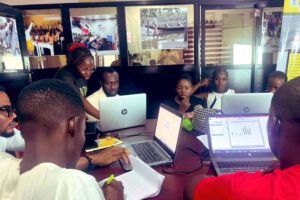
Hack-lab Foundation in Ghana.
The Hack-lab Foundation, based in Ghana, helps young people across Africa gain the skills needed for today’s digital world. They run programs like boot-camps, hackathons, mentorship, internships, and job placement to train youth in tech and prepare them for future careers.
Hack-lab works with top global and regional partners including Twitter, IBM, Vodafone, Standard Bank, and universities like the University of Johannesburg and Kwame Nkrumah University of Science and Technology. One of their major annual events, Hackathon Africa, brings together over 1,000 tech enthusiasts to build solutions for real-life problems.
So far, the Foundation has reached over 12,700 people, organized 20+ hackathons in 11 African countries, supported more than 1,000 women in tech, and helped 1,300+ youth get jobs.
In 2018, they collaborated with the World Bank and Ghana’s Ministry of Sanitation and Water Resources to launch the National Sanitation Hackathon. Over 300 teams submitted innovative ideas to solve sanitation issues. The top 30 teams competed at the final event, and the three best projects received grants to scale their solutions.
In 2020, the foundation launched the AI Ghana Hackathon with support from GIZ FAIR Forward. More than 100 teams built AI tools to solve local challenges. Ten teams were selected for an accelerator program to help them turn their projects into full tech startups.
Hack-lab believes that equal access to opportunities in tech can unlock potential for anyone, no matter their background, gender, or physical condition. That principle guides everything they do.
KALAAN and the Pan-African Vision for Literacy
In Ivory Coast, football legend Didier Drogba is using his platform for more than sports diplomacy. Through his organization KALAAN, Drogba recently signed an MoU with the Association for the Development of Education in Africa (ADEA) to push for nationwide digital literacy.
KALAAN’s approach is holistic engaging civil society, schools, development partners, and governments to make digital training a development priority. Their ambition? To empower 10 million people across Africa over five years, with a strong focus on women, youth, and rural communities. The program will use affordable mobile technology, local language instruction, and training hubs to scale reach.
Offline Solutions for Rural Farmers in Rwanda
Not all digital literacy campaigns depend on high-speed internet. In Rwanda, the Youth for Technology Foundation (YTF) is proving that low-tech tools can create high-impact learning. In remote farming villages, where internet access is limited or nonexistent, YTF distributes inexpensive Android tablets preloaded with offline learning content including how-to videos on internet usage, email setup, and online farming tools.
But what truly sets this initiative apart is its use of local radio. Partnering with community radio stations, YTF broadcasts weekly Q&A programs in native languages, explaining how digital tools can boost crop yields, market access, and financial literacy. For those who can’t read or have never been in a classroom, radio becomes a digital classroom.
This strategy, combining radio with offline tech, ensures that no one is left behind, not even those without electricity.
How Grassroots Collaborations Are Advancing Digital Literacy in Rural Africa
As Africa ramps up efforts to improve digital literacy in rural areas, both local and international collaborative projects offer valuable lessons. These partnerships show that when governments, NGOs, educators, and tech companies work together, real progress is possible.
Globally, successful models like the European Union’s Digital Literacy Project have trained over 100,000 people across 10 countries by uniting public and private sectors. In Australia, the government’s Digital Traineeship Program not only addresses skill shortages but also ensures equal access to digital training for underrepresented groups. These efforts show how large-scale digital inclusion is achievable when collaboration is at the center.
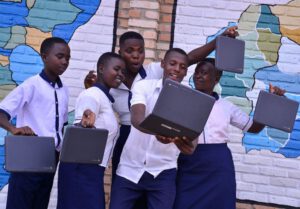
One Laptop Per Child (OLPC) Project
Closer to home, Africa is embracing similar partnerships. Initiatives like Africa50’s Innovation Challenge support tech-driven solutions designed to tackle community-specific issues. Programs such as One Laptop per Child (OLPC), rolled out in countries like Rwanda, South Africa, and Nigeria, aimed to give schoolchildren access to laptops and learning resources. While some challenges emerged like maintaining the hardware and keeping content relevant the projects still highlight how collective efforts can bring technology to underserved areas.
Together, these examples underscore the power of partnerships in bridging Africa’s digital divide, starting from the grassroots
Summary
Digital literacy remains a critical pathway to socio-economic development in rural Africa. The success of both local and global collaborative projects demonstrates that sustainable impact is possible when governments, NGOs, educational institutions, and the private sector work together. Initiatives like the One Laptop per Child program and Africa50’s Innovation Challenge highlight the importance of context-specific solutions, while international efforts such as the EU’s Digital Literacy Project and Australia’s traineeship program offer valuable lessons on scale and inclusivity.
To close the digital divide, more grassroots campaigns are needed designed with local leadership, long-term planning, and accessible tools. Ensuring that rural communities are not left behind in the digital age is not only a matter of equity but a necessary step toward building a more connected and empowered Africa.



